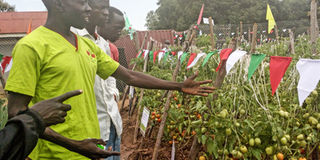Refugees resort to backyard farming to fight malnutrition

Lessons. South Sudan refugees at a demonstration farm set up by East-West Seeds International at Omugo Sub-county, Arua District, last week. PHOTO BY FELIX WAROM OKELLO
What you need to know:
Background. While settling the refugees, government allocates a 30m by 30m piece of land to each family.
When Ms Grace Akandru fled the war in South Sudan and sought refuge in Omugo settlement camp in Arua District, she entirely depended on food supplied by the World Food Programme (WFP).
The family only depended on beans and maize grain from WFP while vegetables, fish and meat were a luxury. Along the way, her children started suffering from malnutrition because they lacked certain food nutrients.
“My two children lacked a balanced diet due to lack of foods such as vegetables. I could not buy the missing foods because I could not afford,” said Ms Akandru during an interview at the weekend.
She said she had to find an alternative and started planting vegetables on her small piece of land. She has not looked back.
During a visit to her makeshift home in the refugee settlement at the weekend, Daily Monitor found Ms Akandru had planted vegetables such as cabbage, onions and egg-plants in her backyard.
“With what I am planting now, my children can have a balanced diet,” she said.
Enablers
Ms Akandru’s success story was enabled under the Nutrition and Income Generation Intervention (NIGI) project, which seeks to provide innovative and sustainable solutions to improve the nutrition and food security for people in and around the refugee settlements in West Nile. NIGI is run by a consortium of NGOs, among them East-West Seeds International.
While settling the refugees, the Office of the Prime Minister allocates a 30m by 30m piece of land for each family for settlement and agriculture.
Another NIGI project beneficiary is Mr Peter Ayan who has established a vegetable garden with support from East-West Seeds International.
Mr Ayan grows cabbages, onions, egg-plants, watermelon and tomatoes on his 10 square metre garden. “My wife has been complaining that my children were getting malnourished because I could not afford to buy other food items.
We were tired of eating beans every day and I believe by continuing to look after these crops, we shall be healthy,” he said.
According to Ms Annet Kiiza, the country director for East-West Seeds International, they target 5,000 refugees. “We realised there are different income levels of refugees. We hope that this intervention will address malnutrition challenges of refugees and also improve their income. We always train them about seedling production, fertilisation, soil and water management, crop production and safe use of pesticides,” Ms Kiiza said.
Food and Agricultural Organisation is also funding the project through the National Agricultural Advisory Services and the Abi- Zonal Agricultural Research and Development Institute (Abi-Zardi) in Arua, which set up demonstration farms for both refugees and host communities.
The one-year programme is aimed at having increased production of cassava, sweet potatoes, maize, okra, onions and beans in refugee camps and the host communities.
About refugee policy
Farmers. Uganda maintains an open door policy to refugees fleeing insecurity from their home countries. Uganda is now home to both illegal and legal migrants mainly from Eritrea, Ethiopia, Burundi, Rwanda, Pakistan, South Sudan, Somalia and the Democratic Republic of Congo. At year end, the total population of refugees in Uganda was 1,395,000 people, with 986,600 people from South Sudan, some 236,400 from the DRC, and some 39,700 from Burundi. While settling the refugees, government allocates a 30m by 30m piece of land to each family.




